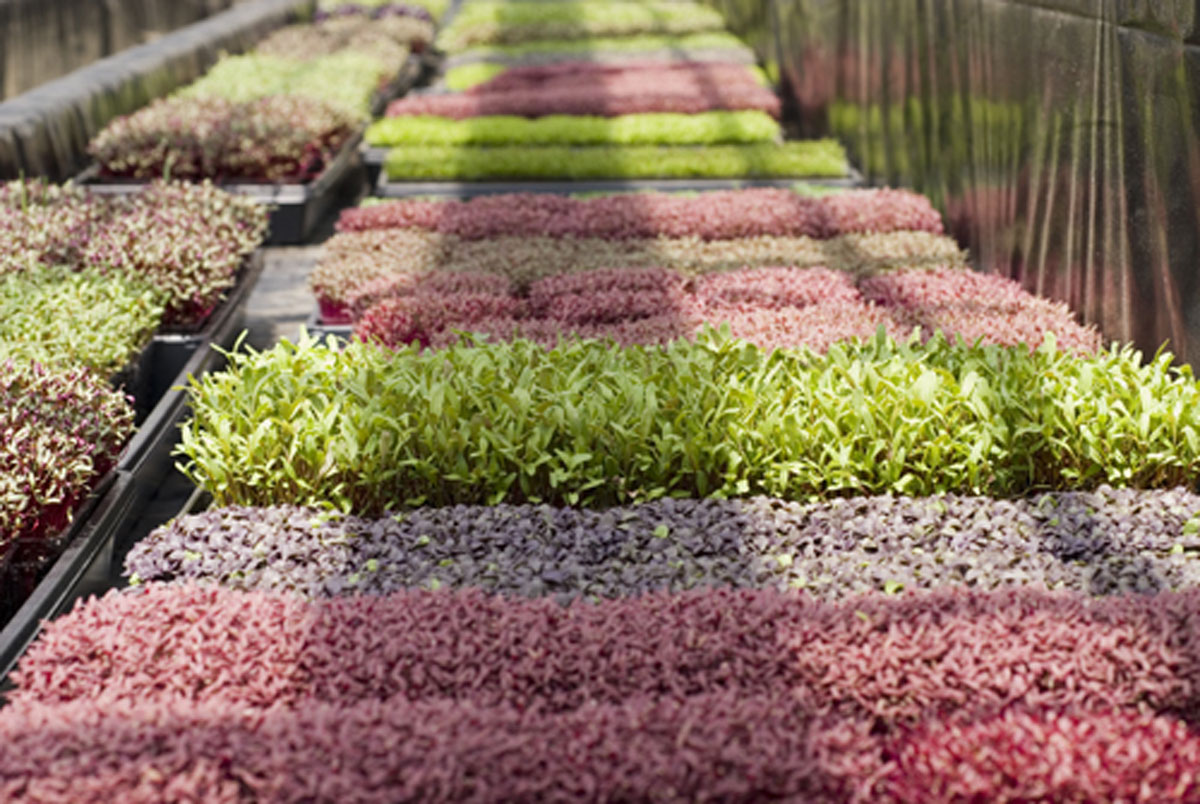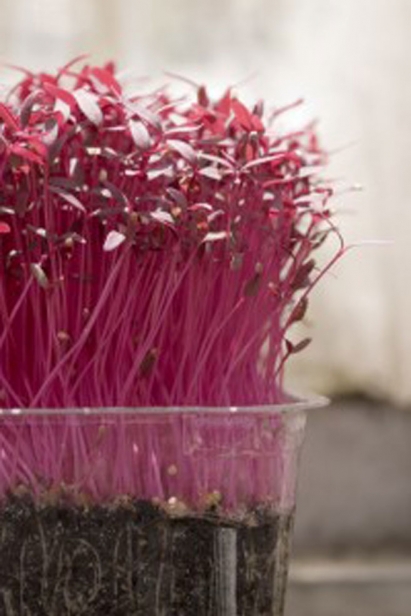Indoor Farming: Farming Turtles
Farming is not an easy way to make a living—it takes an audacious spirit, intrepid determination and maybe even passion. In most cases success or failure comes down to the individual’s abilities and resilience.
Experience is valuable but not required. Perhaps most important are temerity, and fortitude. Lauri Roberts of Farming Turtles in Exeter has all of this and more.
Born in Scarsdale, New York, and educated at Brown University in Providence, Roberts studied biology, environmental science and horticulture. After college she worked for School One, a small independent high school in Providence, before joining Greenpeace. Greenpeace took Roberts to Chicago, where she bought and restored the classic wooden sailboat that would become her home for the next 10 years. While living aboard in Chicago, Roberts began growing sprouts—at first to eat and then to sell. The business grew with numerous wholesale accounts, including Whole Foods.
Life on the lakes was great but Rhode Island was calling, so in 2002 Roberts sold her business and set sail for Narragansett Bay, eventually settling in Wickford Harbor.
Prior to 2008 Roberts grew Farming Turtles— named for a pet turtle—using leased warehouse space. After locating an ideal spot (a 4,000-square-foot building on land in Exeter) Roberts was given a loan through the USDA Farm Service Agency and Bank RI. She built two additional greenhouses on the expanded property but even now, Roberts concedes, she’ll need to expand further to meet demand.
“The sprouts were fun but I wanted to get into microgreens,” said Roberts as we stood overlooking rows of neatly arranged trays brimming with tiny colorful plants. “These little guys are bursting with flavor, and the market for them is exploding.”
SPROUTS VS. MICROGREENS
Sprouts are simply germinated seeds. What is eaten consists of seed, root, stem and pale undeveloped leaves. The seeds are never actually planted but rather processed in water.
In recent years, large-scale organic sprout producers have seen incidences of bacterial con- tamination. A lack of exposure to sunlight in combination with a warm, wet environment can create fertile breeding grounds for unwanted bacteria. Commercial sprout produc- ers are now required to use bleach to sterilize their products, making truly organic sprouts impossible to produce on a large scale.
Microgreens, on the other hand, are a tiny form of young edible greens grown from a variety of different plants. Seeds are planted and grown to heights between two to six inches,
at which point they are harvested (think barber shears), shipped and consumed.
“Microgreens have a much lower seed density, and each plant benefits from exposure to sunlight,” said Roberts. “Furthermore, our turnover time is relatively rapid, just five to 10 days.”
Organic microgreen production is not effortless by any means. Any one of several complications can disrupt or destroy a crop. Temperature and humidity must be carefully controlled. Too wet and damp rot can occur; too dry and the product won’t grow.
None of this seems to faze Roberts and her team. Everyone at the farm seems focused and very much on task. Roberts, while fully engaged in the day-to-day operations, is not bogged down by the details. She also spends at least a third of her time navigat- ing the complex maze of regulations sur- rounding food production.
“The difference between GAP [Good Agricultural Practice, a voluntary standard accepted
by the USDA for small-scale farms nation- wide] and Third Party Certification [a more stringent standard required by larger distribu- tors] is phenomenal,” remarked Roberts. She keeps a massive binder and files to stay on top of it all. “We are very, very clean here—we have to be,” said Roberts.
While regulations might seem a burden, Roberts takes a positive approach. “We would be doing it anyway, it is just the pa- perwork that’s the time killer.”
TO MARKET
Farming Turtles got its start by way of relationships, and that continues today. But the relationships are evolving, especially as Roberts continues to expand across the Northeast and beyond through sales at grocery stores via wholesale distribution networks. Local restaurant sales began after three years in the wholesale market, first with Newport Restaurant Group.
Another customer, chef/co-owner Jake Rojas from Tallulah on Thames in Newport, is an ardent fan. Roberts and Rojas have collabo- rated on ideas and on products. Now that Farming Turtles is expanding its reach, it would be easy to let go of the small one-to- one relationships. In fact the distributors would prefer it.
“Lauri still comes here herself to deliver and see how we are doing—that’s why we love her,” said Rojas. “She gets our feedback, and we exchange ideas. What I like best about her products are the consistency, the distinct flavors and the quality,” Rojas said. Farming Turtles delivers directly to some 20 restau- rants in the Boston area and to other Rhode Island chefs, often through Market Mobile.
GOING BEYOND GREEN
Always one to spot a trend, Roberts saw mushrooms as a growth area but mushrooms are tricky and have special requirements. She started “playing” with mushrooms a few years ago in an old walk-in freezer.
“It has taken a while but I think that we are finally ready to go,” she said. Looking at the two large, airtight and climatically con- trolled chambers filled with growing shiitake and oyster mushrooms, it is easy to agree.
“With Third Party Certification and large- scale distribution, we are poised to take it to the next level,” Roberts said. “We are look- ing at expanding in the very near future.”
As Farming Turtles moves forward—expanding operations, diversifying products and distribution—Rhody locavores have nothing to fear.
If not Roberts herself, then Anna Kwas- niewska—her very capable second in com- mand—will be at local markets to provide retail access to what master chefs already know and appreciate: fine fresh-cut greens, edible flowers and, now, mushrooms.
For more information visit FarmingTurtles.com






